Leila: The Indian Handmaid’s Tale
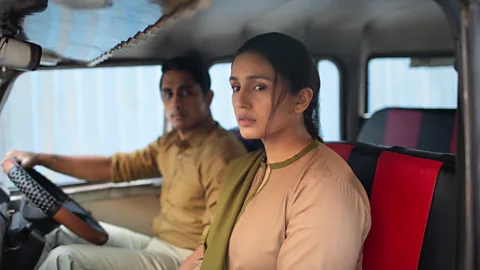 Aditya Kapoor/Netflix
Aditya Kapoor/NetflixThe dystopian TV series Leila is set in a totalitarian regime that suppresses women. Rahul Verma looks at how streaming is allowing new kinds of stories in Indian TV and film.
It’s 2047, 100 years after India’s independence, and in the fictional nation of Aryavarta, water is scarce. The republic’s authoritarian rulers are seizing children of mixed parentage from their families, interning the mothers, and forcibly reprogramming them to serve the nation and to purify their defiled minds. Shalini is one such woman. Her luxurious life with husband Riz and daughter Leila, insulated from the water crisis by wealth, has been torn asunder. However, Shalini refuses to submit, and is determined to do whatever it takes to find her daughter.
More like this:
- Are Mafia dramas getting too close for comfort?
This is the premise for Netflix’s six-part original Indian series, Leila, which became available on the streaming platform in Hindi and English in June. While it has drawn parallels with The Handmaid’s Tale thanks to its depiction of a draconian, patriarchal state suppressing women and restricting their reproductive rights, Leila’s central themes also include climate change and a deeply hierarchical society organised according to religion, caste and wealth.
Untold stories
Huma Qureshi, who plays the lead character Shalini, was immediately drawn to the series, an adaptation of the acclaimed 2017 novel Leila by Prayaag Akbar. “When I read the treatment, I was blown away. I haven’t seen anything like this attempted in India before,” says the Bollywood actress who appeared in Anurag Kashyap’s bloody and breathless mafia films, Gangs of Wasseypur Part 1 & Part 2 (2012).
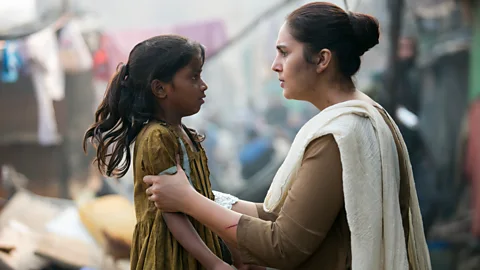 Avantika Meattle/Netflix
Avantika Meattle/NetflixLeila also features Deepa Mehta as executive producer and director of its first two episodes. The Indo-Canadian film-maker made her name in the 1990s and 2000s with three outlier indie films – Fire (1996), Earth (1998) and Oscar-nominated Water (2005). These explore themes that also feature in Leila, including religious hatred, and also show how women fight against being consigned by fanatical holy men to joyless, exploited lives.
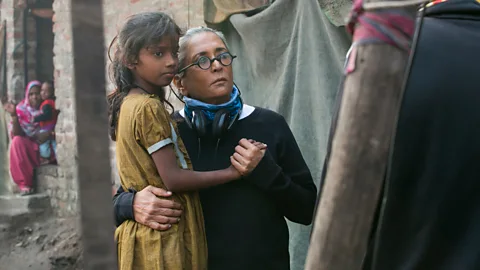 Avantika Meattle/Netflix
Avantika Meattle/Netflix“Deepa’s fabulous, a brilliant director – I’ve seen all of her films and loved Earth, Fire and Water,” says Qureshi. “With Leila the material is so exciting, so fresh, it’s right up Deepa’s street – and Deepa’s vision for Leila, the look, the mood, the design, and the way it’s shot, is so beautiful and stark. She gave me so much space as an actor.”
Leila has drawn both praise and criticism for presenting an ugly, uncomfortable glimpse of a future India: but nobody could predict just how timely some of the grim realities it portrays would be. In June, India’s sixth largest city, Chennai (formerly Madras), with a population of 4.6million, suffered a severe water crisis, resulting in long queues at government trucks dispensing water.
“Leila was never supposed to be about shock value, but it is a cautionary tale about people living in extraordinary circumstances like not having drinking water – you think, ‘That’s crazy! That could never happen’”, says Qureshi. “So when there was no drinking water in Chennai in the week Leila was released because the water table receded, it was so scary.”
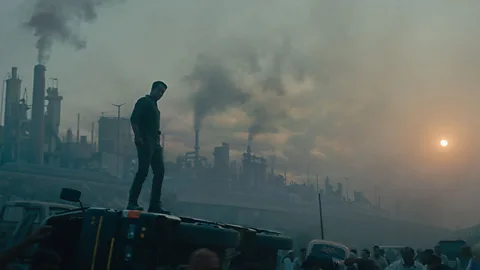 Netflix
NetflixQureshi flags another example of reality trumping fiction. “In episodes one and two we were shooting on a massive garbage dump, that’s a real-life garbage dump on the outskirts of Delhi. It’s a huge mountain of garbage, 65-metres high and it’s constantly smoking and catching fire, it was so difficult to breathe when we were shooting there – it was recently in the news that it will soon be taller than the Taj Mahal.
Raising questions
“We have governments telling us climate change and pollution is not a problem, it’s not going to happen in our lifetimes, it’s not immediate. But it is immediate and it is an issue. What’s going to happen? Where will we end up? What will be the tools of exploitation used to perpetuate cruelty and crimes against humanity? These are some of the questions Leila asks,” explains Qureshi, who’s from Delhi, the most polluted capital city in the world according to a recent study by Greenpeace.
Qureshi echoes The Handmaid’s Tale’s author Margaret Atwood’s observation that sci-fi and its alternate worlds are fundamentally about the now. “The real dystopia is when we try to sell utopia,” says Qureshi.
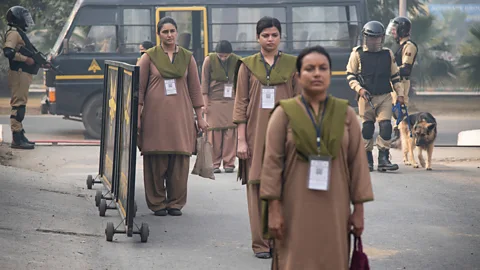 Avantika Meattle/Netflix
Avantika Meattle/NetflixLeila also nods to events dominating our newsfeeds beyond India: we see young children locked up in cages, and a character calls for the building of a giant wall to keep out the unwanted. Qureshi feels this is why Leila has not only made waves in India but also touched viewers all over the world.
“Leila is not just about India,” says Qureshi. “It’s about Trump and his politics, it’s about the forces behind Brexit, it’s about the migration crisis in Europe and the horrific picture of the Syrian boy, Alan Kurdi, washed up on a beach, that shook the world; it’s about all of this. Every country, every continent is going through its own crisis of identity. Leila is set in India but it could be set anywhere, it’s a story of everywhere – maybe that’s why there’s appreciation for Leila globally, people can relate to it, they can see their world in it.”
Leila is among a group of edgy TV series coming out of India, a result of the international streaming giants, Netflix, Amazon Prime and Hulu, investing in the Indian market and producing original Indian-language series and films. Anticipation is building for the second season of Netflix’s Sacred Games, a gripping, grisly thriller uncovering the dark heart of the Mumbai underworld, which airs next month.
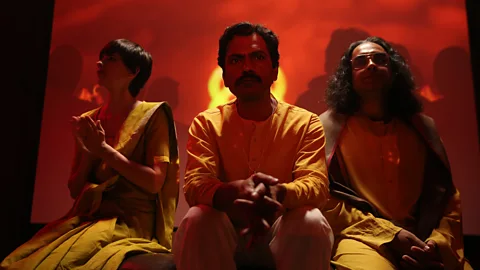 Zishaan A Latif/Netflix
Zishaan A Latif/NetflixAmazon’s Made in Heaven, a drama series centred on the lives of two wedding planners in Delhi, is another success, offering nuanced, smart perspectives on middle-class India and issues including class, caste, patriarchy and homophobia, through the lens of Indian weddings.
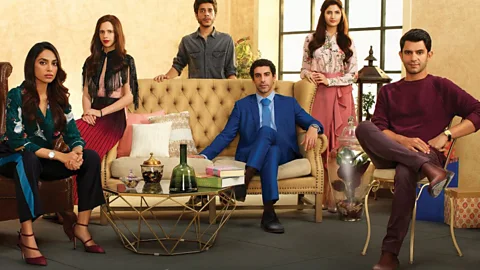 Amazon Prime Video
Amazon Prime VideoOnline streaming platforms and the shows and films they produce in India do not require a stamp of approval from India’s notoriously conservative and increasingly politicised government department, the Central Board of Film Certification, which oversees films as well as terrestrial and satellite TV.
New voices
Qureshi is excited by what the online streaming platforms are bringing to India in allowing a broader range of stories to be told, offering greater opportunities for storytellers and actors, and reaching both domestic and international audiences. Leila is available in 190 countries – even the biggest Bollywood blockbusters wouldn’t be released on that scale, and would only be available to see in cinemas for a limited period of a few weeks. The online streaming platforms are opening up TV series and films from India to global audiences in a way that hasn’t happened before.
 Atsushi Nishijima/Netflix
Atsushi Nishijima/Netflix“I find it amazing that people in the UK, and America are watching Leila; the online streaming model makes storytelling so much more democratic,” says Qureshi. “I don’t think many mainstream film producers would make Leila – they would ask, ‘will it work?’ Ultimately they wouldn’t make it because so many people in the chain think it’s a risk, but the success of Leila or When They See Us shows that people will watch something, regardless of where it is from, or whether it’s dark or cerebral, as long as it engages and moves them.”
Qureshi’s current favourite TV shows include the UK series Fleabag and Peaky Blinders, HBO’s Chernobyl and Ava DuVernay’s When They See Us, and she finds hope in the online model enabling film-makers and storytellers all over the world to connect with audiences on a global scale. “I find that so beautiful because that’s what the world needs right now,” she says. “The more we can tell human stories and talk about shared histories and cultures, we can create a better world.”
Love TV? BBC Culture’s TV fans on Facebook, a community for television fanatics all over the world.
If you would like to comment on this story or anything else you have seen on BBC Culture, head over to our Facebook page or message us on Twitter.
And if you liked this story, sign up for the weekly bbc.com features newsletter, called The Essential List. A handpicked selection of stories from BBC Future, Culture, Worklife and Travel, delivered to your inbox every Friday.
